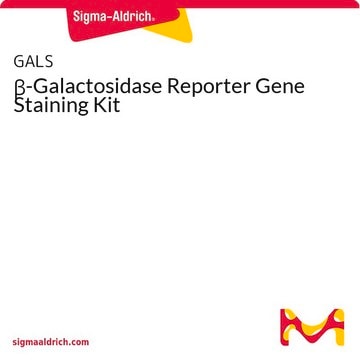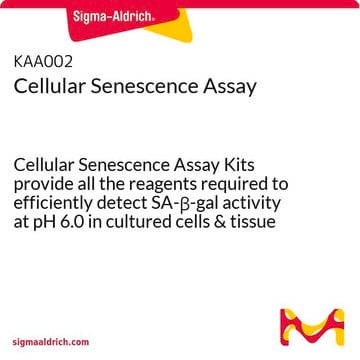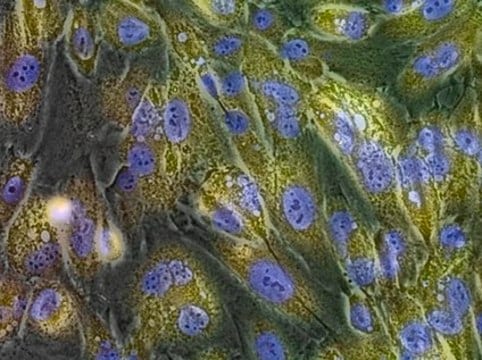71074
BetaBlue Staining Kit
Convenient visualization of β-gal in cells or tissues
Bejelentkezésa Szervezeti és Szerződéses árazás megtekintéséhez
Összes fotó(1)
About This Item
UNSPSC kód:
41106513
NACRES:
NA.31
Javasolt termékek
gyártó/kereskedő neve
Novagen®
tárolási körülmény
OK to freeze
kiszállítva
wet ice
Általános leírás

Convenient visualization of β-gal in cells or tissues
The BetaBlue Staining Kit provides direct visualization of β-galactosidase reporter expression in isolated cells, tissues, or intact organisms. The kit contains sufficient reagents for 100 staining reactions and includes solutions of the substrate X-Gal (5-bromo-4-chloro-3-indolyl-β-D-galactopyranoside) and Reaction Buffer optimized for rapid, sensitive histochemical staining with minimal background. The exceptional staining seen with the BetaBlue Staining Kit enables quick, accurate determination of transfection efficiencies, assessment of stable cell line generation, and transgene expression in tissue slices or whole mounts of transgenic animals.
Komponensek
•2 × 50 mlBetaBlue Reaction Buffer
•3 × 1 mlBetaBlue X-gal Solution
•3 × 1 mlBetaBlue X-gal Solution
Figyelmeztetés
Toxicity: Multiple Toxicity Values, refer to MSDS (O)
Jogi információk
NOVAGEN is a registered trademark of Merck KGaA, Darmstadt, Germany
Tárolási osztály kódja
10 - Combustible liquids
Analitikai tanúsítványok (COA)
Analitikai tanúsítványok (COA) keresése a termék sarzs-/tételszámának megadásával. A sarzs- és tételszámok a termék címkéjén találhatók, a „Lot” vagy „Batch” szavak után.
Már rendelkezik ezzel a termékkel?
Az Ön által nemrégiben megvásárolt termékekre vonatkozó dokumentumokat a Dokumentumtárban találja.
Sebastian Frische et al.
American journal of physiology. Renal physiology, 320(1), F74-F86 (2020-12-08)
Variations in the claudin-14 (CLDN14) gene have been linked to increased risk of hypercalciuria and kidney stone formation. However, the exact cellular localization of CLDN14 and its regulation remain to be fully delineated. To this end, we generated a novel
Keishi Otsu et al.
Journal of bone and mineral research : the official journal of the American Society for Bone and Mineral Research, 31(11), 1943-1954 (2016-10-27)
During tooth development, oral epithelial cells differentiate into ameloblasts in order to form the most mineralized tissue in the vertebrate body: enamel. During this process, ameloblasts directionally secrete enamel matrix proteins and morphologically change from low columnar cells to polarized
Tudóscsoportunk valamennyi kutatási területen rendelkezik tapasztalattal, beleértve az élettudományt, az anyagtudományt, a kémiai szintézist, a kromatográfiát, az analitikát és még sok más területet.
Lépjen kapcsolatba a szaktanácsadással








